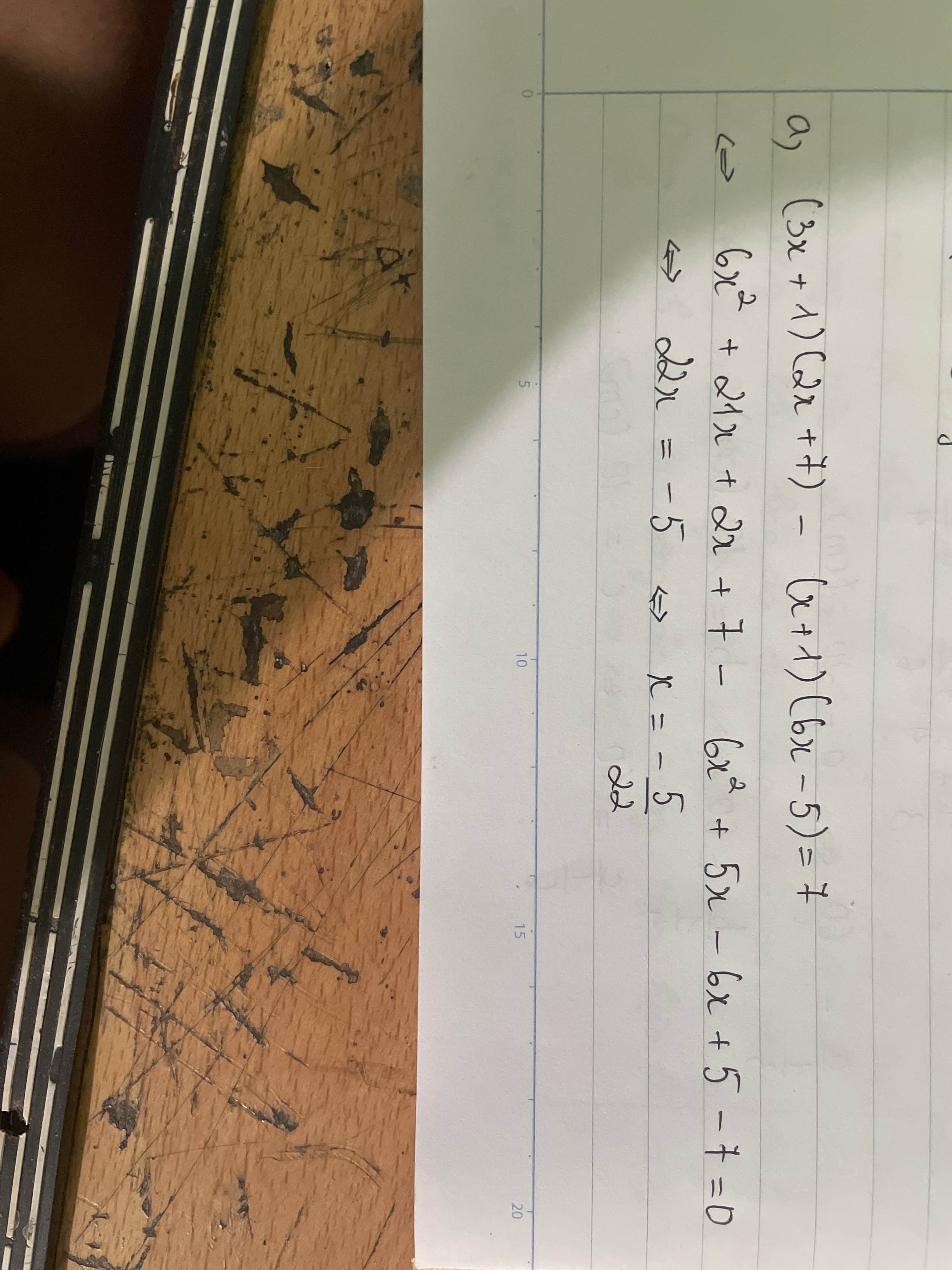Hãy nhập câu hỏi của bạn vào đây, nếu là tài khoản VIP, bạn sẽ được ưu tiên trả lời.

a) <=> \(2x^2-8x+3x-12+x^2-7x+10=3x^2-5x-12x+20\)
<=> \(2x^2-8x+3x-12+x^2-7x+10-3x^2+5x+12x-20=0\)
<=> \(5x-22=0\)
<=> \(5x=22\)
<=> \(x=\frac{22}{5}\)
b) <=> \(24x^2-9x+16x-6-4x^2-7x-16x-28=10x^2+5x-2x-1\)
<=> \(24x^2-9x+16x-6-4x^2-7x-16x-28-10x^2-5x+2x+1=0\)
<=> \(10x^2-19x-33=0\)
<=> \(10x^2-30x+11x-33=0\)
<=> \(10x\left(x-3\right)+11\left(x-3\right)=0\)
<=> \(\left(x-3\right)\left(10x+11\right)=0\)
<=> \(x=3;x=-\frac{11}{10}\)

a. (2x + 1)2 - 4x2 + 2x2 - 2 = 0
<=> (2x + 1 - 2x)(2x + 1 + 2x) + 2(x2 - 1) = 0
<=> (4x + 1) + 2x2 - 2 = 0
<=> 4x + 1 + 2x2 - 2 = 0
<=> 2x2 + 4x - 2 + 1 = 0
<=> 2x2 + 4x - 1 = 0
<=> 2x2 + 4x = 1
<=> 2x(x + 2) = 1
Vì 1 chỉ có tích là 1 . 1 nên:
<=> \(\left[{}\begin{matrix}2x=1\\x+2=1\end{matrix}\right.\Leftrightarrow\left[{}\begin{matrix}x=\dfrac{1}{2}\\x=-1\end{matrix}\right.\)
\(a,\Leftrightarrow4x^2+4x+1-4x^2+2x^2-2=0\\ \Leftrightarrow2x^2+4x-1=0\\ \Leftrightarrow2\left(x^2+2x+1\right)-3=0\\ \Leftrightarrow2\left(x+1\right)^2-3=0\\ \Leftrightarrow\left(x+1\right)^2=\dfrac{3}{2}\\ \Leftrightarrow\left[{}\begin{matrix}x+1=\sqrt{\dfrac{3}{2}}\\x+1=-\sqrt{\dfrac{3}{2}}\end{matrix}\right.\Leftrightarrow\left[{}\begin{matrix}x=\dfrac{-2-\sqrt{6}}{2}\\x=\dfrac{-2+\sqrt{6}}{2}\end{matrix}\right.\)
\(b,\left(x-2\right)\left(x+2\right)-\left(x+3\right)^2-2x-5=0\\ \Leftrightarrow x^2-4-x^2-6x-9-2x-5=0\\ \Leftrightarrow-8x=18\\ \Leftrightarrow x=-\dfrac{9}{4}\)

2:
a: =>x-1=0 hoặc 3x+1=0
=>x=1 hoặc x=-1/3
b: =>x-5=0 hoặc 7-x=0
=>x=5 hoặc x=7
c: =>\(\left[{}\begin{matrix}x-1=0\\x+5=0\\3x-8=0\end{matrix}\right.\Leftrightarrow x\in\left\{1;-5;\dfrac{8}{3}\right\}\)
d: =>x=0 hoặc x^2-1=0
=>\(x\in\left\{0;1;-1\right\}\)

a,\(\Leftrightarrow\left(x-1\right)^3+\left(2-x\right)\left(4+2x+x^2\right)+3x\left(x+2\right)-17=0\)
\(\Leftrightarrow x^3-3x^2+3x-1+8-x^3+3x^2+6x-17=0\)
\(\Leftrightarrow9x-10=0\)
\(\Leftrightarrow x=\frac{10}{9}\)

a) Ta có: \(\left(x-3\right)=\left(3-x\right)^2\)
\(\Leftrightarrow\left(x-3\right)^2-\left(x-3\right)=0\)
\(\Leftrightarrow\left(x-3\right)\left(x-4\right)=0\)
\(\Leftrightarrow\left[{}\begin{matrix}x=3\\x=4\end{matrix}\right.\)
b) Ta có: \(x^3+\dfrac{3}{2}x^2+\dfrac{3}{4}x+\dfrac{1}{8}=\dfrac{1}{64}\)
\(\Leftrightarrow x^3+3\cdot x^2\cdot\dfrac{1}{2}+3\cdot x\cdot\dfrac{1}{4}+\left(\dfrac{1}{2}\right)^3=\dfrac{1}{64}\)
\(\Leftrightarrow\left(x+\dfrac{1}{2}\right)^3=\left(\dfrac{1}{4}\right)^3\)
\(\Leftrightarrow x+\dfrac{1}{2}=\dfrac{1}{4}\)
hay \(x=-\dfrac{1}{4}\)
c) Ta có: \(8x^3-50x=0\)
\(\Leftrightarrow2x\left(4x^2-25\right)=0\)
\(\Leftrightarrow x\left(2x-5\right)\left(2x+5\right)=0\)
\(\Leftrightarrow\left[{}\begin{matrix}x=0\\x=\dfrac{5}{2}\\x=-\dfrac{5}{2}\end{matrix}\right.\)
e) Ta có: \(x\left(x+3\right)-x^2-3x=0\)
\(\Leftrightarrow\left(x+3\right)\left(x-1\right)=0\)
\(\Leftrightarrow\left[{}\begin{matrix}x=-3\\x=1\end{matrix}\right.\)
f) Ta có: \(x^3+27+\left(x+3\right)\left(x-9\right)=0\)
\(\Leftrightarrow\left(x+3\right)\left(x^2-3x+9\right)+\left(x+3\right)\left(x-9\right)=0\)
\(\Leftrightarrow\left(x+3\right)\left(x^2-2x\right)=0\)
\(\Leftrightarrow x\left(x-2\right)\left(x+3\right)=0\)
\(\Leftrightarrow\left[{}\begin{matrix}x=0\\x=2\\x=-3\end{matrix}\right.\)

Pt tương đương:
\(2x^2+3\left(x^2-1\right)=5x^2+5x\)
\(\Leftrightarrow2x^2+3x^2-3=5x^2+5x\)
\(\Leftrightarrow5x=-3\)
\(\Leftrightarrow x=-\frac{3}{5}\)
Vậy pt có nghiệm là :\(x=-\frac{3}{5}\)

a) \(=x^2-2x+3-2x-x^2-2+4x=1\)
b)\(=6x+10x^2-6x+2x=10x^2+2x=2x\left(5x+1\right)\)
c)\(=3x^{n-2}.x^{n+2}-3x^{n-2}.y^{n+2}+y^{n+2}.3x^{n-2}-y^{n+2}.y^{n-2}\)
\(=3x^{2n}-y^{2n}\)

a: \(3x\left(x-3\right)+4x-12=0\)
=>\(3x\left(x-3\right)+\left(4x-12\right)=0\)
=>\(3x\left(x-3\right)+4\left(x-3\right)=0\)
=>\(\left(x-3\right)\left(3x+4\right)=0\)
=>\(\left[{}\begin{matrix}x-3=0\\3x+4=0\end{matrix}\right.\Leftrightarrow\left[{}\begin{matrix}x=3\\x=-\dfrac{4}{3}\end{matrix}\right.\)
b: Sửa đề:\(\left(x+1\right)\left(x^2-x+1\right)-x^3+2x=17\)
\(\Leftrightarrow x^3+1-x^3+2x=17\)
=>2x+1=17
=>2x=17-1=16
=>\(x=\dfrac{16}{2}=8\)
c: \(\left(x-3\right)\left(x+5\right)+\left(x-1\right)^2-6x^4y^2:3x^2y^2=15x\)
=>\(x^2+2x-15+x^2-2x+1-2x^2=15x\)
=>\(15x=-14\)
=>\(x=-\dfrac{14}{15}\)

1: Ta có: \(\left(3-x\right)^2+\left(2x+1\right)^2-\left(2-x\right)^2-\left(2x+1\right)^2=0\)
\(\Leftrightarrow\left(x-3\right)^2-\left(x-2\right)^2=0\)
\(\Leftrightarrow\left(x-3+x-2\right)=0\)
\(\Leftrightarrow x=\dfrac{5}{2}\)
2: Ta có: \(\left(1-2x\right)^2-3\left(x-1\right)^2+\left(x+1\right)^2-\left(x-1\right)^2-\left(x-1\right)^2=0\)
\(\Leftrightarrow4x^2-4x+1-3x^2+6x-3+\left(x+1\right)^2-2\left(x-1\right)^2=0\)
\(\Leftrightarrow x^2+2x-2+x^2+2x+1-2\left(x^2-2x+1\right)=0\)
\(\Leftrightarrow2x^2+4x+1-2x^2+4x-2=0\)
\(\Leftrightarrow x=\dfrac{1}{8}\)